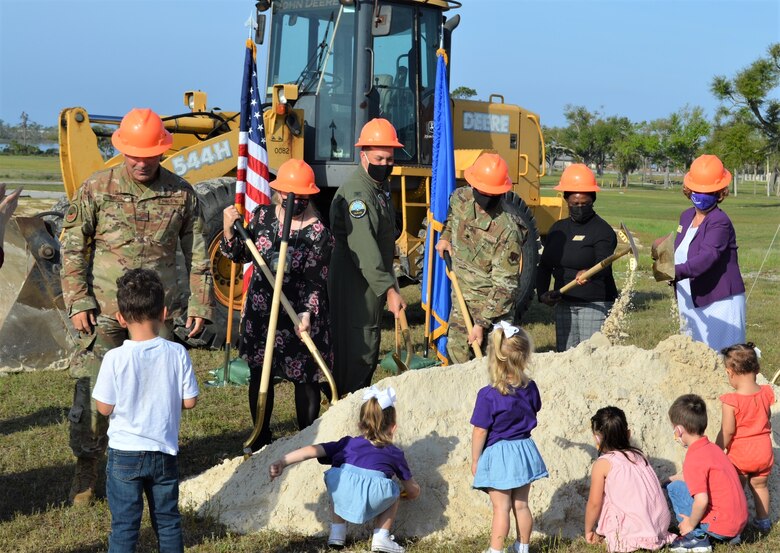The Air Force Installation and Mission Support Center continues its dedication to Airmen, Guardians and their families by partnering with Headquarters Air Force to deliver quality child care facilities across the enterprise.
Quality infrastructure enables quality care for military children while their parents serve our nation. AFIMSC primary subordinate units, the Air Force Civil Engineer Center and Air Force Services Center, work together to provide safe and operational child care facilities at Air and Space Force installations.
"Installations are more than military sites, they are where our Airmen and Guardians live, train and work," said Col. Dave Norton, AFCEC's Facility Engineering Directorate deputy director. "We're working with colleagues across the Air Force to deliver modern child care facilities that help balance the demands of the mission and family life."
Air Force Services is leading the development of a Child and Youth Facilities Master Plan to help senior leaders with investment planning decisions for child care facilities. The master plan will outline the current inventory of child care facilities, identify installations requiring additional capacity, and provide strategic direction for new construction and facility repair and sustainment.
The first master plan is expected to be published spring or early summer 2021. This initial plan will focus on military construction projects for child care facilities but will be expanded in the future to incorporate other child and youth facility project types.
"The master plan is going to set the strategic direction and functional prioritization for child and youth facility planning efforts," said Deb Willey, Department of the Air Force Child and Youth Programs chief. "Our intent is to provide commanders and leaders with a document to help in project advocacy."
With Congressional support, the Air Force has already identified 15 child development centers needing greater capacity and facility condition improvements.
"We have six CDCs in the design phase and continue planning efforts for an additional nine projects," said Maj. Mercy Teo, HAF Civil Engineer Directorate MILCON program manager. "We expect the highest priority projects will be ready for construction award in fiscal year 2022, depending on available funding."
AFCEC, a key collaborator in the master plan execution, provides planning and design solutions to equip installations with quality facilities to support child care needs.
Also part of the AFIMSC enterprise, AFSVC designs child and youth programs to build resilient Airmen and Guardians, and their families. Its programs offer child and school age care, recreation, sports, and learning and educational opportunities.
"Together, the AFIMSC units are building the roadmap for delivering critical installation and mission support needs for the enterprise," said Patti Mehrens, AFSVC Child and Youth Programs division chief. "It takes the entire team to design and build state-of-the-art child care facilities."
AFSVC brings the programming requirements to the table while AFCEC brings the building requirements and code compliances.
"Working together we provide installations with a safe, functional and fully compliant building," Mehrens said. "Each project builds on the next project, and lessons learned and cost savings are adopted for future projects."
Of all CDCs the Air Force is planning, the facility at Sheppard Air Force Base, Texas, is the highest priority. The investment responds to the base's growing needs of a greater child care capacity in a premium facility.
The new state-of-the-art center, currently in design, will offer high quality, affordable and accessible child care for military families. Designed to accommodate 200 children, the building will replace the previous facility which required improvements and standard upgrades.
The new center will be located where it's more convenient and easily accessible for the community. Location is an important factor in CDC design planning.
"Working with AFSVC we determine a site to build a resilient, safe and conveniently located facility," said Shannon Best, AFCEC project manager. "We incorporate modern construction standards into the design to protect the facility from vulnerabilities and provide a safe environment for children."
At Tyndall AFB, Florida, the 325th Fighter Wing recently broke ground on its new $31.6 million CDC project, part of the massive Tyndall AFB rebuild following major hurricane damage in 2018.
The new facility, centrally located near the base exchange and food court on the southside of the installation, is designed to withstand 165 mph hurricane-force winds and 19 feet of storm surge. The center is one of the first major military construction efforts underway at Tyndall AFB and should be complete in September 2022.
"The CDC is part of the community-focused facilities, designed to be in the Zone 11 Community Commons along with the chapel and two community commons facilities," said Milea Franklin, Natural Disaster Response Program Management Office MILCON Execution South lead. "The new location will not only simplify accessibility for Tyndall families, but encourage a central community gathering area to reduce the need for additional vehicle use."

Six future members of the new Tyndall Air Force Base Child Development Center in Florida gather around with their plastic shovels to participate in a groundbreaking ceremony, March 31, 2021. (U.S. Air Force photo by Sarah McNair)






